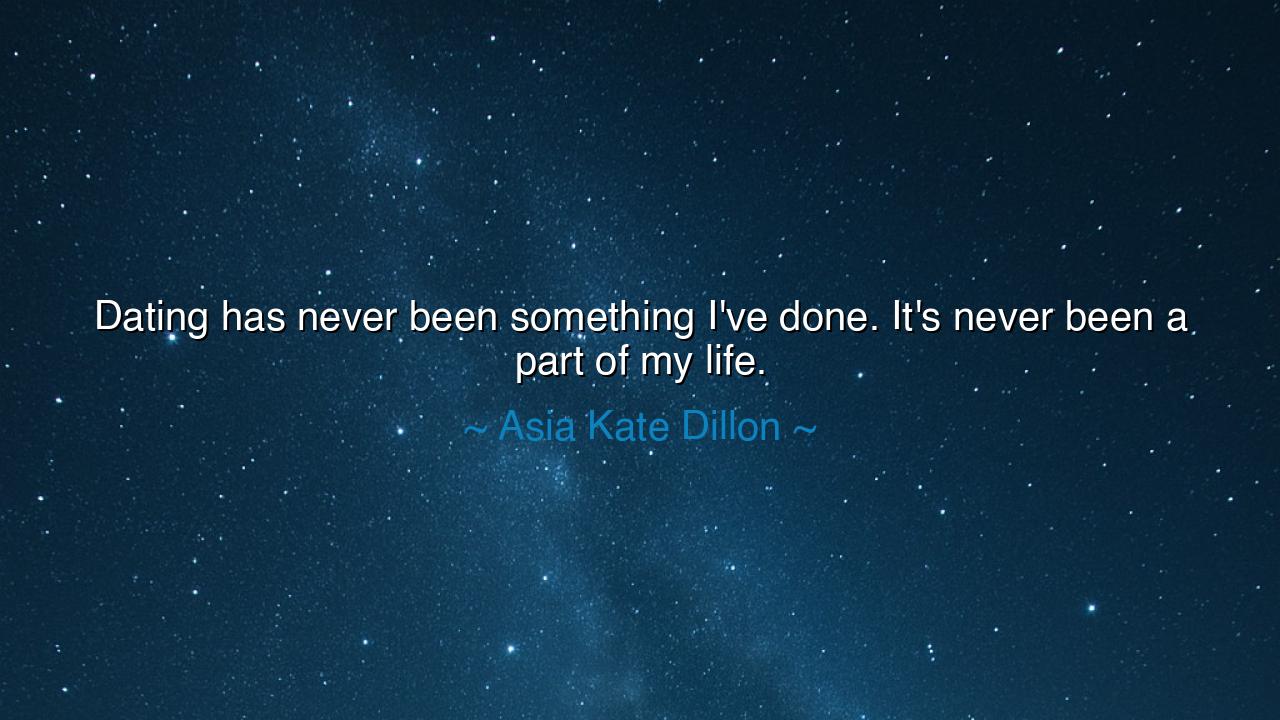
Dating has never been something I've done. It's never been a part






In the ledger of human customs, a clear voice steps aside from the crowd and says: “Dating has never been something I’ve done. It’s never been a part of my life.”** So speaks Asia Kate Dillon, and the sentence lands like a smooth stone in a rushing river. It does not quarrel with the water; it simply refuses to be carried. In an age that turns romance into ritual and ritual into requirement, these words announce a sovereign boundary: companionship is not a tax the soul owes to society. The meaning is plain and radical—one’s life need not be measured by the rites other people rehearse.
Hear the wisdom beneath the brevity. To say dating has never been a part of my life is not an indictment of love; it is an affirmation that intimacy wears many faces—craft, community, kinship, vocation, devotion. Some hearts are built like cloisters, some like marketplaces, some like laboratories; each can be holy if tended with care. When the world prescribes a single road to belonging, such a confession becomes a beacon to travelers who walk by another star. It teaches: your calendar may be full of purpose even if your evenings are empty of appointments.
Consider the origin of this stance in the forge of identity. The speaker’s work, voice, and presence have been instruments tuned to questions of truth—who I am, what I make, how I serve. In such a workshop, time is a precious metal, and peace is a tool. Refusing the dance others demand is not loneliness; it is stewardship. Some call it abstention; the ancients might call it consecration—setting apart energies for the task the soul knows is its own.
Let a true story walk beside this teaching. Nikola Tesla, bright and solitary, once said that affection might distract him from invention; he married no person, but he courted lightning. His choice did not make him more virtuous than his peers; it made him himself. So, too, with writers who keep long vigils, with healers who pour their hours into the hurt, with monks and musicians who pledge their prime to a call. History shows many ways to love the world; dating is one of them, not the only one.
Yet the saying is not a banner of disdain. It does not scorn those who pair; it simply declines to pretend. There is courage in naming a path that is neither common nor compulsory. When we admit that dating is not a part of my life, we loosen the quiet shame of those who also feel out of step, and we invite a richer grammar of connection: friendship as covenant, collaboration as kinship, art as vow, solitude as teacher.
What, then, shall we pass down as guidance? First, let no custom claim your conscience without consent. Second, recognize that meaning is plural: a day can be full of love without being full of romance. Third, measure a person not by who they date, but by what they cultivate—mercy, skill, integrity, joy. The orchard is judged by its fruit, not by the number of hands that have touched its branches.
Take these practical actions as provisions for the road. (1) Write a brief life charter naming your current devotions—work, study, friendships, causes—and honor them with calendar space equal to any courtship. (2) Build a circle of chosen kin: schedule standing dinners, shared projects, walking rituals; let companionship be structured, not accidental. (3) When questioned, answer without apology: “Dating is not part of my life right now; here is what is.” Practice this line until it feels like a doorway, not a defense. (4) Tend your solitude: read, rest, and craft; make the inner room beautiful enough that you never bargain away your peace for the fear of being different. Do these, and you will find that the sentence once whispered becomes a standard borne high—proof that a life can be radiant without romance, whole without conformity, and faithful to the singular work for which it was made.






AAdministratorAdministrator
Welcome, honored guests. Please leave a comment, we will respond soon